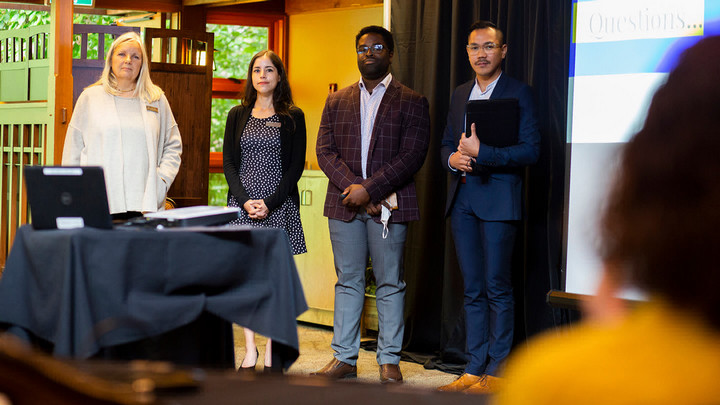How Jessica Garcia bet on herself and found a new career path

Five years ago, if you had told Jessica Garcia, MBA ’23, that she’d be working in the sustainability sector at Ernst & Young, she wouldn’t have believed it.
“Sustainability and climate change was always a personal passion of mine,” Garcia recalls. “But I didn’t know that I could turn that into a career.”
At the time, Garcia was settled in her role at BC Hydro, where she had spent six years managing supply chain and projects. “I wanted to add something more business-focused to my resume. I originally studied psychology, but my career started in business, and I wanted to complement that with more education and a degree.” When she discovered the MBA in Sustainable Innovation program, she was immediately hooked. “It was unique. It focused on climate change and sustainability and at that time, few schools offered this kind of program,” she says.
Today, she’s a manager at Ernst & Young, leading teams on climate change and sustainability. She credits much of her success to the skills, confidence and the networks she built during her MBA. “I learned a lot, of course, from teachers and our guest speakers, but also from my classmates,” she says. "My whole career path changed from the moment I started."
Taking the first step toward a sustainable future
Looking back on the two years she spent commuting from BC’s mainland to Vancouver Island for her weekend classes, Garcia recalls how that experience opened her eyes to a new future. “I honestly thought I was going to build my entire career at BC Hydro,” she explains. But her classmates—coming from diverse backgrounds, ages, and countries—had a profound impact on her. “We had teachers, nurses, physiotherapists, accountants, managers, directors—just so many different perspectives,' Garcia shares. “From those in their 30s, like me, just starting out, to senior professionals in their 60s. It was incredible to see how sustainability became a common thread.”
“One of the first things we all noticed was how different our career paths were. This program really united us in a shared way of thinking: How can we do business, but in a more sustainable way, from all the different angles?” This exposure to diverse approaches, along with seeing her classmates step out of their comfort zones and share their learnings with one another, helped put things into perspective not only for Garcia, but for her classmates as well.
“More than half of us changed jobs or quit our jobs entirely to start our own thing and became entrepreneurs,” she says. "Once I finished, I decided to leave my cushy job and just start something completely different.”
Navigating the transition
While her employer gave her the chance to work on a project that aligned with her new career focus, it was Garcia’s own skills and effort that made the change possible. This was a turning point that helped her apply what she had learned in a practical way. For her capstone project, she worked with BC Hydro as a client. 'It all came together,' Garcia explains. 'I was working, and BC Hydro gave us the chance to act as consultants, offering real-world experience with a real client.'"
By the time she started pitching her capstone, her interest in sustainability had only deepened. “I wanted to take this to the next level and make it my career—not just for the project. I kept talking about how important it was, especially working within supply chain, so working with our suppliers and the scope three emissions and all this that we didn't have in place. But in government, it’s harder—there aren’t enough resources or time.” This gave her the push she needed to shift her career focus but also reinforced the importance of sustainable innovation across industries.

Seeing the bigger picture with sustainable innovation
The MBA program didn’t just change how Garcia thought; it changed how she approached sustainability. "The program might not make you an expert in anything," she explains. "But what I really liked was that you touch on so many different topics, dissecting them from various angles. For example, you can look at greenhouse gas emissions from a financial perspective, a business perspective, even a creative advertising perspective. Each view gives you a broader understanding of the same issue.”
The ability to “zoom out” has been essential in her work today. "When you're working in one area, you often only see it from your perspective. This program taught how sustainability affects an entire company and what I can do for a client. I also learned about emerging concepts and regulations that I didn’t fully understand at the time, but then I’d hear them at work and think, ‘Oh, I know what that is.’ It made me want to learn more and I’d take additional courses or read up on it. It just familiarizes you with what’s happening in the field."
High risk, high reward
For many, leaving a stable career to start something new is a daunting undertaking, and Garcia would be the first to admit that it was a big risk. But taking that leap has paid off, bringing her closer to her passion for sustainability and climate change, something she once thought wasn’t in the cards for her.
Now, after more than two years at Ernst & Young, Garcia has proven that a commitment to sustainability can lead to new and rewarding career paths—sometimes, all it takes is a leap of faith. “What’s the worst that could happen?” she says. “I thought I was going to be a psychologist, have my own therapy practice—and now I’m doing something completely different. Even a few years ago, if you told me, ‘You’re going to be a climate change and sustainability manager,’ I would’ve said, ‘No, I’m comfortable where I am.’ But that changed with the program and everything I learned,” she says. “It really changes you as a person because your mindset changes.”
Making the leap meant stepping out of her comfort zone and trading stability for uncertainty. “It was a big risk, but I have no regrets,” she says with a smile. “It was a complete 180 for me.”

